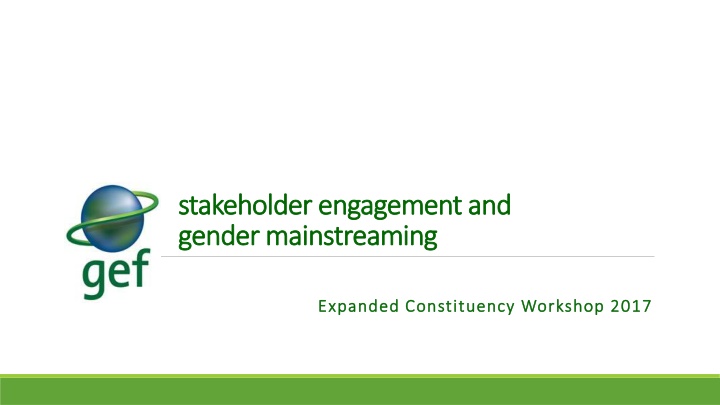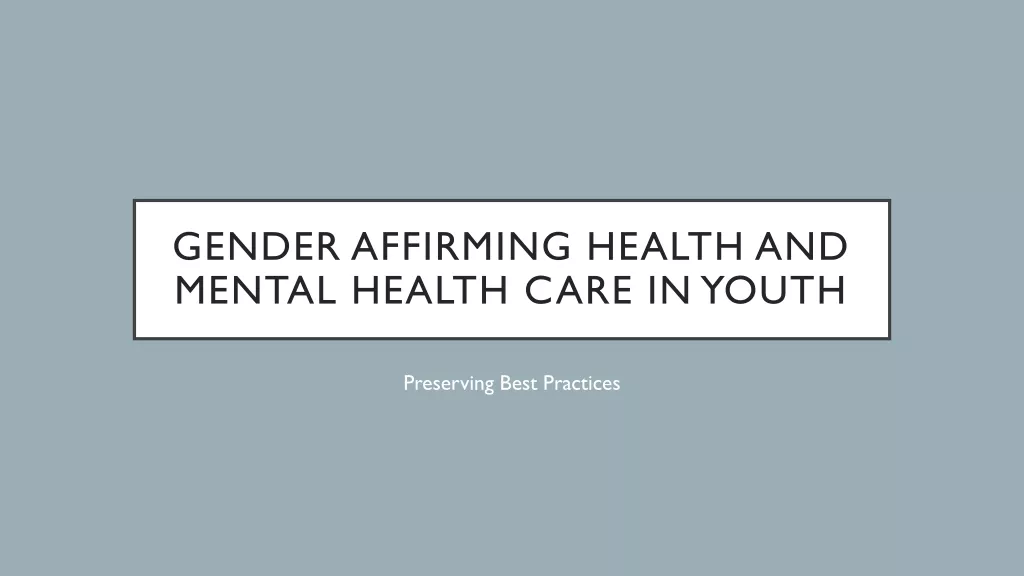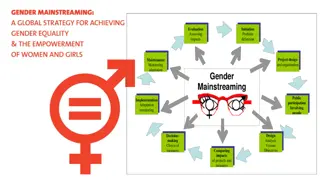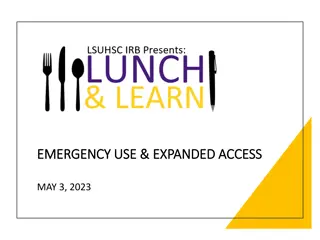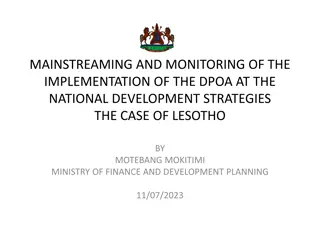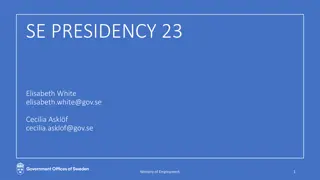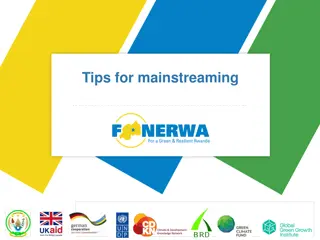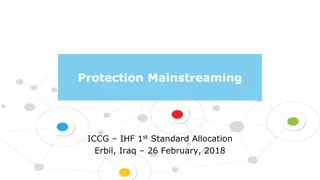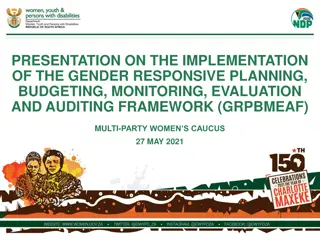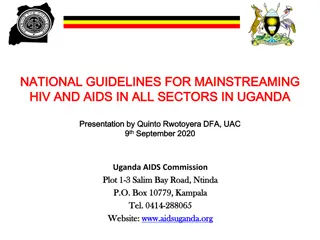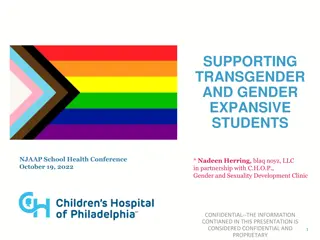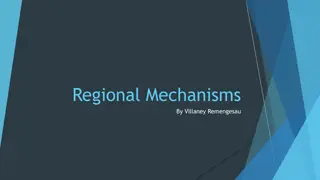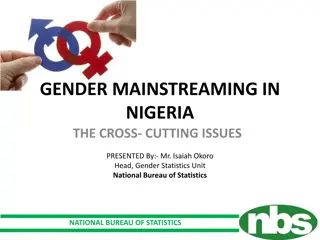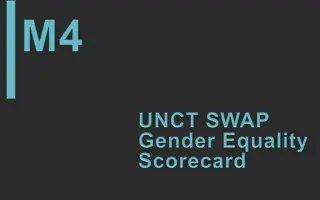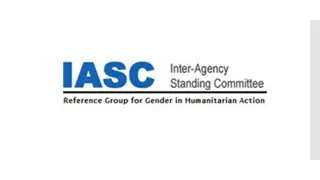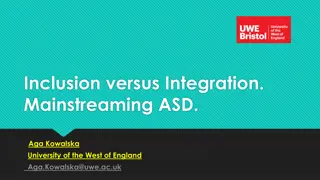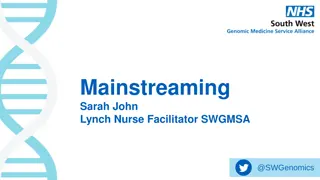Stakeholder Engagement and Gender Mainstreaming at Expanded Constituency Workshop
This session at the Expanded Constituency Workshop in 2017 focused on global commitments, GEF policies, stakeholder engagement, and gender equality. It emphasized the importance of participation, ownership, partnerships, and accountability in addressing social and economic needs while highlighting the significance of gender equality in resource use and decision-making.
Download Presentation

Please find below an Image/Link to download the presentation.
The content on the website is provided AS IS for your information and personal use only. It may not be sold, licensed, or shared on other websites without obtaining consent from the author.If you encounter any issues during the download, it is possible that the publisher has removed the file from their server.
You are allowed to download the files provided on this website for personal or commercial use, subject to the condition that they are used lawfully. All files are the property of their respective owners.
The content on the website is provided AS IS for your information and personal use only. It may not be sold, licensed, or shared on other websites without obtaining consent from the author.
E N D
Presentation Transcript
stakeholder stakeholder engagement and engagement and gender gender mainstreaming mainstreaming Expanded Constituency Workshop 2017 Expanded Constituency Workshop 2017
this session this session overview of global commitments & GEF policies & standards breakout session to share lessons learned, reflect on current practices & discuss opportunities to strengthen or clarify GEF policy, guidelines or procedures
stakeholder engagement and gender equality stakeholder engagement and gender equality participation matters participation matters ownership, partnerships and accountability social and economic needs of individuals and stakeholder groups diverse skills, experiences and knowledge gender equality matters gender equality matters men and women use natural resources differently men and women are affected differently by changes to natural resources men and women have different rights or access to resources, and decision-making power agents of change
global commitments and processes global commitments and processes RIO (1992), CEDAW (1997), Beijing Platform for Action (1995), MDGs (2000) Crosscutting priority in Multilateral Environmental Agreements CBD, UNCCD, UNFCCC, (Paris Agreement) SDGs and the 2030 Agenda for Sustainable Development GEF 2020 strategy, GEF-6 policy recommendations and programme directions
Public involvement and stakeholder engagement Public involvement and stakeholder engagement GEF Policy (1996) GEF Policy (1996) GEF Guidelines GEF Guidelines (2014) (2014) Providing steps and and mechansims across the GEF project cycle information dissemination consultation for setting priorities consultation for project/program design and implementation reporting, monitoring and evaluation conflict Resolution and grievance function Outlining principles for Public Involvment contributes to environmental and financial sustianbility needs to address social, cultural and economic needs of people responsibility rests with government and GEF Agencies needs to be flexible, broad-based and transparent
policy on gender mainstreaming (2011) policy on gender mainstreaming (2011) Institutional level Project level Agency accreditation requirements & compliance Stakeholder Stakeholder consultations consultations Social/Gender analysis Social/Gender analysis Competency Capacity Processes Project Standards Gender responsive Gender responsive results results - -based framework framework Gender sensitive Gender sensitive activities activities based 6
Project implications (1) Project implications (1) Information easily accessible and effectively disseminated to relevant stakeholders Regular meetings of the OFPs and relevant stakeholders to discuss GEF programming Stakeholders identification: Mechanisms for stakeholder consultation and engagement in setting priorities; Adequate representation of relevant stakeholder groups, such as civil society in National Steering Committees. Information dissemination & programming Best practices & standards 7
Project implications (2) Project implications (2) Stakeholder identification and mapping (incl. civil society, indigenous peoples, and women's groups) - gender responsive stakeholder and consultation Mechanisms for gender responsive stakeholder consultation and engagement Applying a standard of Free, Prior and Informed Consent (FPIC), or other relevant system for consultation (Indigenous Peoples) Social assessments including gender analysis (baseline data collection); Develop results frameworks that are gender responsive (e.g. linking findings of gender analysis to project theory of change, outcomes, outputs and activities identifying sex-disaggregated indicators Project design Best practices & standards ; 8
Project implications (3) Project implications (3) Implementation of stakeholder engagement plans and/or gender action plans; Applying a standard of Free, Prior and Informed Consent (FPIC), or other relevant system for consultation with Indigenous Peoples; Partner with relevant CSOs to execute projects; Cultivate gender sensitive project teams; Mechanisms to deepen engagement of key stakeholders from civil society, including gender specialist and women groups Project implementation Best practices & standards ; 9
Project implications (4) Project implications (4) Project monitoring and Report on stakeholder engagement; Report on gender dimensions and associated results; Adjust project activities and foster learning; Include women and stakeholders in monitoring and evaluation activities. evaluation Best practices & standards ; 10
Working Group on Public Involvement (2014) Working Group on Public Involvement (2014) Develop a plan to revise PIP review Agency policies and procedures Lacks clarity and consistency of operational policy (e.g. unclear mix of aspirational principles and affirmative policy mandates) MOVING FORWARD compile Agency best practices Council Decision: present an updated policy on stakeholder engagement and access to information for consideration in December 2017 Activities Findings review GEF monitoring practices of public involvement Should align and reflect policies and advances in past 20 years provide recommendations to enhance PIP Need to agree on clearer mandates to support better stakeholder engagement across increasingly diverse GEF partnership
The Gender Equality Action Plan (2015 The Gender Equality Action Plan (2015 2018) 2018) results-based management Consolidated the GEF Gender Partnership Increased monitoring and reporting on gender Conducted portfolio review Supported capacity building efforts and platforms for learning Action plan knowledge & learning project cycle MOVING FORWARD Update GEF s Policy on Gender Develop Guidelines and Tools programming & policy capacity building
THANK YOU THANK YOU For more information on: For more information on: Public involvement Public involvement please contact please contact pilar pilar barrera barrera rey rey: : pbarrera@thegef.org pbarrera@thegef.org Gender equality Gender equality please contact please contact gabriella gabriella richardson richardson temm temm: : grichardsontemm@thegef.org grichardsontemm@thegef.org www.thegef.org www.thegef.org
